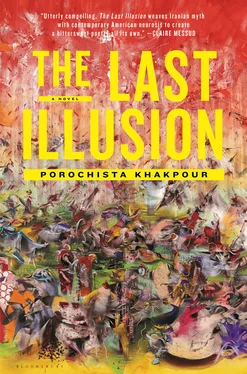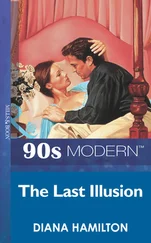“You told her my name?” Zal stammered.
The officer nodded.
“Can you tell me what she said? Please?” Zal’s voice was quivering and raising at the same time.
“She said something about how you don’t want to be here — you know where you need to be. I take that to mean out, right, buddy?” The officer pointed to the door.
Zal nodded slowly, his body still shaking. He knew it would be some time before it would be still again.

That week, neither Zal nor Hendricks brought Asiya up. They did not fight anymore. They pretended it was like old times when they lived together: Zal the child and Hendricks the father. He made the old meals he used to, and Zal once again camped out on the couch and watched television. Both men, even though they were going through all sorts of chaos, never let on that anything was bad. They both suspected the other was disintegrating a bit, but they chose not to go there. They could afford nothing but expressions of optimism at that point, the balance was so thrown off, so close to the edge they were. There could be no rocking of boats — that they both knew.
Zal did not let on, for instance, that he was too scared to sleep at night, much like he used to be as a child. But Hendricks sensed this and, instead of addressing it and his anxiety about his son — now an adult and too scared to go to sleep — Hendricks chose to pretend that he wanted to read to Zal again. In fact, he just wanted to read in general, read certain material he knew Zal liked, but he pretended it was his material of choice, too. And so he told Zal that he would be doing that for the hour before bed, and that Zal was welcome to join him.
“What is the material?” Zal asked cautiously. There was so much he felt he could not endure.
Hendricks smiled. “The Book of Kings, ” he said, and immediately Zal’s insides warmed. His favorite. It had been their old ritual, Hendricks reading him tales of his namesake and his magical adventures. There was no book Zal loved more, no hero he adored more than that other Zal, from whom he was so impossibly different, to his own chagrin.
Hendricks pulled a chair to Zal’s couch-bed and began to read. Zal found himself drifting to a different time, his youth, or at least the era that had become the substitute for what is youth in most people’s lives. And he didn’t hear much, just felt the old familiar feeling: suddenly the room had a warmer glow, suddenly Hendricks expanded into more god than father, and suddenly he was smaller, smaller than he could even imagine, with nothing to do but be embossed with words, even ones that were ever so thinly related to him. Hendricks could have been saying anything, but it was a good particular something, like a mystical chant, something he was connected to but couldn’t quite understand.
Hendricks read and read and Zal drifted in and out. He did catch a few passages, usually moments when Hendricks’s voice went from its soothing rich monotone to something a bit more shaky, a touch more feverish, hinting of unstable.
Zal heard, We are all born for death, we belong to death, and we have given our heads into its keeping.
He interrupted: “Who said that?”
Hendricks murmured softly, “You did, of course.” He smiled gently at Zal’s alarmed eyes. “Zal, silly. Zal, Zal .”
And Zal drifted in and out again, and the next time he tuned in, many hours later, so many hours later that it felt like dawn — had they really been up all night? It seemed like it — it wasn’t Hendricks’s intonation that riled him but the word magic.
Hendricks was channeling a new character, declaring, I’m a magician: I’m the opposite of a straightforward, honorable man. When my lord goes to war against someone and gets into difficulties, I set to work. At night I show people things in their sleep, and this disturbs even those who are calm and careful by nature. It was I who sent you the nightmare that bothered you so much. But I should try for something stronger, because my spells didn’t work. Our stars let us down, and all my efforts dispersed like so much wind. If you’ll spare me, you’ve found a very skillful assistant. .
Zal made a sound, somewhere between gasp and sob.
“Are you okay?” Hendricks cut in. “My, it’s getting late. Or should I say early. Epic session there. You’ve been half-asleep for much of it.”
“I didn’t remember a magician,” Zal said.
“Funny, neither did I,” Hendricks said. “We rarely got this far into it. It’s nearly done.”
“What happens to the magician?”
Hendricks paused, skimming ahead with his eyes. “He’s killed. Beheaded right then and there. Those were his final words.”
Zal nodded. Somehow it made sense, context out of context, and yet how startling it was. That must be the key. There was magic, there was miracle, there was madness, all untethered, and all one. It was this moment, this moment before.
“Dangerous times” were Zal’s final words before he fell asleep next to Hendricks, eyes half-closed, also too lazy to make it to his own bed.
“They were,” Hendricks muttered, agreeing, though only he was referring to the world of The Persian Book of Kings .
When Zal awoke the next morning, his mind was full of dream refuse he could not easily shake off. Maybe he had listened more than he realized. In his head, there were warriors with bodies like tree trunks on horses with shields and swords; women weeping, women of incomparable beauty, broken; there were wars, weddings, and births; and there was nature, birds — one great bird, greater than the rest, who was holding him in a giant nest in a forest that felt all too familiar. He imagined himself as Zal, the Zal, from his royal birth to his abandonment in the wild, his bird-raised upbringing to his warriordom. He wanted so badly to be great, to be fearless, to look at all the chaos around him and have direction. He wanted to lead and declare and denounce. He wished he could write himself into the lines of that ancient azure-colored book in front of him, the book he could not read, for which Hendricks, in order to read, had taught himself the mother tongue of that one woman he had loved, slowly over time, in her honor.
In Zal’s head, he was animated like a comic book superhero, a foot taller maybe, perhaps fifty pounds heavier, radiant and rough, a man greater than men, fighting something he couldn’t quite make out, but a force of evil. He tried to make out what the menace was, tried to refocus into the dream world again, and although he wasn’t sure it was from his dream, or inspired by any of the epic’s verses, he suddenly saw it clearly: a magician. A magician with a face the color of bronze, teeth whiter than silver, and wild eyes of an otherworldly gold. The magician was at the gates of a great building, laughing wildly into immaculate blue skies. And Zal, great warrior Zal, was watching. He wasn’t laughing — not because he couldn’t (this Zal presumably could), but because he was angry. In this momentary fantasy, the enemy was, for reasons he could not understand, Silber.
“I’m not normal, am I?” he said out loud one afternoon, days later.
Hendricks, who was watering plants at that moment, was unsure who it was directed at. But who else. “What?” he called, even though he was fairly sure he heard.
“I’ve never been normal and I’m never going to be normal,” Zal announced. “And really, did I want all that stuff? Love and my own home and a job and wife and kids and all that stuff?”
“Oh, Zal,” Hendricks said, coming over to him and reaching for his shoulder, attempting to draw him into an embrace.
Читать дальше













